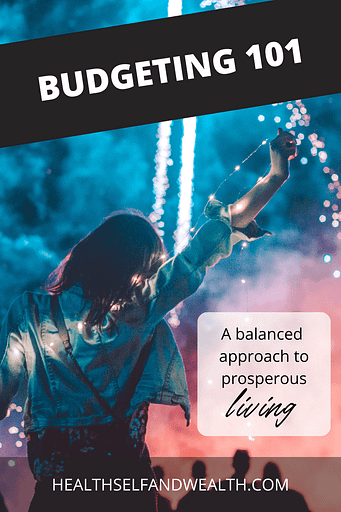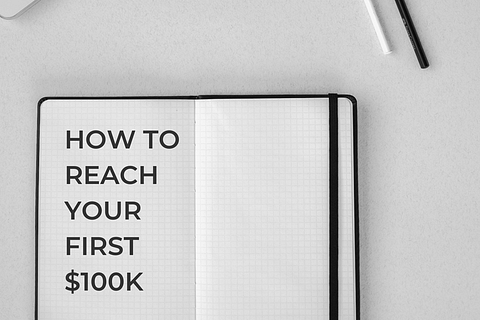
First lesson of budgeting 101: the amount of money in your bank account doesn’t matter.
Unless you’re worried about how you’re going to put food on the table or pay next month’s rent. Then money is everything.
The real value of money is what it brings you. What matters is your peace of mind, financial stability, and freedom.
Now this may be controversial, but income doesn’t dictate who’s going to become wealthy or not. I know people who make 6-figures and live a glamorous lifestyle but have less money in their bank account than my friend who drives a 1970s pickup truck living on half that income.
There’s a formula for building wealth: spend less than you earn and invest the rest. The foundational component to master is your spending habits. It’s the reason why 70% of lottery winners go broke within the first 5 years.
If you want to set yourself up for financial success now and into the future, keep reading for a deep dive into a budgeting process that will actually work and probably make you happier too.
Welcome to budgeting 101 because a spending plan is a foundational skill required to build wealth for peace of mind, financial stability, freedom, or whatever it brings you.
- How to set financial goals
- What is a budget?
- How does a budget help you
- How to create a budget that actually works
Please note I am not a licensed financial advisor. This information is for education purposes only. Every person has a unique financial situation. The best approach will be different for everyone. Accordingly, do your own due diligence before making any financial decision.
Budgeting 101: How to Set Financial Goals
The Health Self and Wealth philosophy is the importance of money doesn’t actually have anything to do with the money itself.
Instead it’s about the options, the freedom, the peace of mind, the control over your own life.
Money isn’t everything, but life can be extra difficult without it.
All that being said, I like to remind myself of this sentiment often. I want to remember why money matters to me in an attempt to prevent my type-A personality from obsessing over reaching an arbitrary number in a bank account.
Set lifestyle goals first
To keep myself aligned with my true goals, I set my money goals based on my lifestyle goals. In other words, I think about what my best life looks like.
Then I reverse engineer that to understand what money goals will help me live that life.
If you could only ask yourself one question to understand what your dream life looks like, consider this one:
What would you do if you woke up tomorrow with $1 million? How would you spend your time going forward?
For any other analysts out there who need to think about it from multiple angles, here’s a guided deep dive into defining your dream life.
Then set financial goals
Once you’re satisfied you have a general idea of a dream life for yourself, it’s time to think about how money will help you live that life.
How much would you spend a year to support that lifestyle?
Then multiply that number by 25. Take a deep breath in and let it out slowly.
That’s your financial independence number. Once your investment accounts total that, you are completely free.
Work becomes optional. You are no longer dependent on anyone or anything for your financial well-being.
Now how do you reach that number? After paying off high interest debt and building an emergency fund, then investing.
These are all money decisions that build your wealth and get you closer to financial freedom.
Now most people don’t reach financial independence until their 60s, then retire. But there’s no rule that says you have to wait until then.
Regardless of when you want to reach it, financial freedom is for everyone. Unless you literally want to work until the day you die.
It’s a goal that many people don’t think about until they get closer to retirement, but the earlier you start, the easier it is. That’s why I wanted to emphasize this goal in ~budgeting 101.
Short and Mid Term Financial Goals
There are other financial goals to think about too, like short to mid term financial goals.
Here’s a list of some financial goals to help you start thinking about any other goals you may have.
- Saving for a large upcoming purchase (home down payment, wedding, having a child, buying a small business, etc.)
- Saving for medium sized one time purchases (vacation, holiday gifts, taxes, etc.)
Write down some financial goals that come to your mind. The act of actually writing them down on paper is a powerful way of setting your intentions.
Budgeting 101: What is a budget?
Maybe you’ve never met our friend budget yet. She’s the kind of gal you’ve heard a lot about and perhaps it’s been more bad than good.
You’ve heard she’s a mix between the person at a party who screams turn the music down and a CEO who pushes profits above all else. Maybe you’re not that excited to meet her…
Budgets sometimes get a bad rap for being restrictive. Certainly no one is raving about them being the life of a party. (No matter how many times I try!!! lol jk kinda)
But they don’t have to be restrictive or boring! Instead of introducing you to a budget, I want to introduce you to my friend the Spending Plan.
She’s fun, she’s flexible, and she’s dedicated to helping you spend more on the things you value most and helping you eliminate those Sunday brunches with your frenemies you dread anyway.
Budgeting 101: How does a budget help you
A spending plan helps you use your money in a way that helps you live your life the way you want to. It helps you prioritize money towards the things you want most.
It also shows you if you veer off course so you can pivot if needed. Did you know if an airplane leaving LA and heading to Italy takes off one degree in the wrong direction it will land in Africa?
A spending plan will help you ensure you are on track to reach your goals.
Budgeting 101: How to Create a Budget that Actually Works
Is anyone so excited about a spending plan now that you’ll bring it up at your next party??? Maybe not yet, but I’ll ask again after I share my 5 best tips on creating a budget that actually works.
- Give yourself grace. Plan for the unexpected in your budget so you have the flexibility when things inevitably don’t go exactly as you planned.
- Pay yourself first. Earlier you wrote down specific financial goals you wanted to reach. When you make money, immediately set aside some of it for your specific goal.
- Automate whenever possible. Save time and free up your brain power and for thinking about things other than remembering to pay your water bill.
- Track. If you aren’t aware of the decisions you are making and the impact they have on your progress to your financial goals, you may just end up in Africa when you wanted to be in Italy.
- Evolve. You’re not etching your spending plan in stone. As you grow and change, your spending plan should evolve with you.
If any of this thinking/process/philosophy resonated with you, you may like the templates I’ve already created.
If you are not at all satisfied with your current spending habits, then check out the Spend Smarter Spreadsheet. It’s designed to help you determine how to spend more on the things that bring you the most value and less on the things that don’t. This is best for people who are focused primarily on how they spend money.
If you are more focused on reaching specific financial goals, you may enjoy a tracker that gives you a comprehensive look at your financial landscape. All my fellow goal getters also may like the progress bars that track your progress towards your financial goals. Check it out here.
If you are not a spreadsheet gal at all, you can use pen and paper or various budgeting apps to track your spending.
Budgeting 101: Conclusion
So to recap,
- Define your dream life and set your financial goals accordingly.
- Choose a method to track your spending.
- Once you understand your spending habits create a spending plan that aligns with your values and positions you to reach your goals.
Now there are other blog posts that will tell you to spend 20% of your income on this, 50% on this, and 30% on this.
I intentionally didn’t do that because your spending plan should be unique to fit your own personal finance goals.
However, I would recommend following the path to wealth: spend less than you earn and invest the rest.
Happy spending intentionally, friends! And I dare you to tell your friends about your spending plan the next time you’re out.
Let me know how it goes 😉
Want more content like this? Join us behind the scenes in our Wealthy Women Club newsletter.








